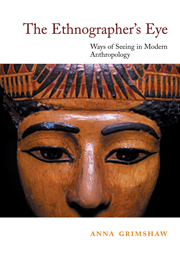Book contents
- Frontmatter
- Contents
- Preface
- Acknowledgements
- Introduction
- Part I Visualizing anthropology
- Part II Anthropological visions
- 5 Cinema and anthropology in the postwar world
- 6 The anthropological cinema of Jean Rouch
- 7 The anthropological cinema of David and Judith MacDougall
- 8 The anthropological television of Melissa Llewelyn-Davies
- Epilogue
- Notes
- Index
7 - The anthropological cinema of David and Judith MacDougall
Published online by Cambridge University Press: 05 June 2012
- Frontmatter
- Contents
- Preface
- Acknowledgements
- Introduction
- Part I Visualizing anthropology
- Part II Anthropological visions
- 5 Cinema and anthropology in the postwar world
- 6 The anthropological cinema of Jean Rouch
- 7 The anthropological cinema of David and Judith MacDougall
- 8 The anthropological television of Melissa Llewelyn-Davies
- Epilogue
- Notes
- Index
Summary
David and Judith MacDougall have been leading figures in the project of anthropological cinema for over two decades. They began working in the late 1960s, in the aftermath of the creative explosion in postwar cinema which was inaugurated by the Italian neorealist school. The impulse behind the formal, technological and substantive innovations of British Free Cinema, the French New Wave and the American direct cinema movement was a commitment to an expansive democratic project. The new film-makers broke decisively with the old categories of fiction and documentary, and with the established hierarchy of professional practice.
The MacDougalls have made their own distinctive contribution to postwar cinema. They sought to employ its new techniques in areas of traditional anthropological enquiry. The problems they encountered in attempting to synthesise the separate but related traditions of cinema and scientific ethnography precipitated a bold experimentation with method, as the location of their work shifted. The MacDougalls first began to develop their anthropological cinema in the context of East Africa, later they moved to Australia, and more recently they have made films in Europe and Asia.
Although David MacDougall made his 1993 film Tempus De Baristas alone, most of the work considered in this essay was carried out in partnership with his wife, Judith MacDougall. The first film, To Live With Herds (1971), was attributed to David MacDougall as solo director.
- Type
- Chapter
- Information
- The Ethnographer's EyeWays of Seeing in Anthropology, pp. 121 - 148Publisher: Cambridge University PressPrint publication year: 2001
- 1
- Cited by

